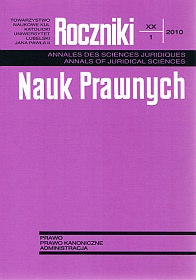Radio Broadcasting and Television as Tools for Realisation of the Teaching Mission of the Church. Legal Guarantees and Their Application in Poland Since 1989
Abstract
The right of the Church to employ radio broadcasting systems and television is a natural law, therefore it has a universal character and unchanging in time and space. Radio and TV media the access to which is regulated by the State which can actually provide (guarantee), hinder or even render impossible access to radio and television broadcasting for certain subjects. The position of a given state depends on its political regime. Article 20 of the Concordat guarantees the Church a right to possess and use its own public media by virtue of the Polish law. Article 48 § 3 of the Act On Church-State Relations in the Polish Republic has a similar effect.
Article 20 of the Concordat also guarantees the Church a right to broadcast programmes on the radio and television by virtue of the Polish law. Article 48 § 1 of the above-mentioned Act spells out these guarantees in such a way that it recognizes the right of the Church to broadcast Sunday and church holiday services as well as religious-ethical, social and cultural programmes. Simultaneously, the Act leaves the mode of execution of the law conditional upon any agreements holding between the Commission of the Polish Episcopate and public radio and TV broadcasters.
Overall, it can be concluded that the legislation of the Third Polish Republic guarantees (provides) the Catholic Church a right to possess its own mass media, such as radio and television, which are in possession of ecclesiastical institutions, and a right to broadcast its own programmes through these media. The Catholic Church uses these guarantees, but the degree to which they are used does not do justice to real needs of the faithful living in a democratic state with a rule of law.
Copyright (c) 2010 Roczniki Nauk Prawnych

This work is licensed under a Creative Commons Attribution-NonCommercial-NoDerivatives 4.0 International License.


